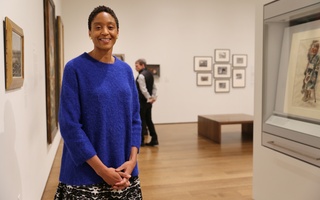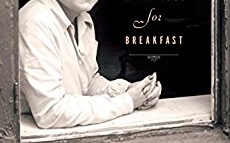Janet Jackson believes in reincarnation. The Panorama installment of her “State of the World” tour made it impossible for any reasonable watcher to disagree. Songs from across eras took on new life, reinventing samples with them. Present and past icons became larger than life and joined her in song onscreen. Jackson herself—a new mother at 50 whose pregnancy halted her “Unbreakable” album tour in 2016—came back dancing with the full force of her sexuality. Decades of art forms, and human flesh collided at high speed.
The show was part of the final stretch of Jackson’s tour and served as a daring Saturday headliner for Panorama, whose audience is mostly too young to have followed her career. Bookended by its strongest political statements, the show seemed perfectly designed to assert her relevance.
The first of many videos was a frightening compilation of quotes and statistics about gun violence, the US-Mexico border crisis, police killings of black civilians, and white supremacy. A graphic of the black power clenched fist was shown, with members of the endless crowd emulating the symbol themselves. At the tail end of her set, she sang two 1989 songs that call out social inequality: “Rhythm Nation” and “State of the World.” By combining the political convictions of her past work with dark warnings about the present, she underlined both the worth of her early work and the continuation of injustice. Compared to the vague “There are crazy things happening in the world right now, let’s all love each other” speeches heard during earlier acts (such as SZA’s), actually naming the issues and appearing to take a stand on each was bold and authoritative.
Her performance of “What About” tackled another issue: that of abuse. Scenes of domestic violence unfolded among the backup dancers, while Jackson, whose brother has described her previous marriage as abusive, displayed her most vulnerable acting and her most seductive anger. The story that played out onstage concluded in an emotionally significant act, with Jackson fighting back against one of the wrongdoers and pushing him off his chair.
Still, she did not need such a blatant show of force to convey her body’s power. Throughout the 90-minute set, every ponytail toss and hip thrust exuded sex and physical command—sometimes fury, always ferocity. Sweat poured down her temples.
As many issues as this tour was determined to confront, it also had to bear unexpectedly the weight of a personal sorrow. Jackson’s father, Joe Jackson, died prior to the start of her tour’s North America leg one month ago. In tribute, she projected photos of him over the stage during her performance of “Together Again.” She originally wrote this ballad-turned-bop to express her conviction that she would someday be reunited with her friends who died from AIDS. The song’s ability to dance through heartbreak has always been stunning, but in the context of her father’s death it was particularly breathtaking. Her vocals were creamy and youthful. She made heart hands at the audience, who took up the chorus. In response, she laughed and shouted “Oh! Oh! Oh!” in syncopation. While she sang, “I can see your star shining down on me,” a full moon and the images of her father lit up the field together.
She illuminated other artists, too. An enormous video of J. Cole filled in his verse on the sultry “No Sleeep” from her 2015 album “Unbreakable,” and the rendition of “Any Time, Any Place” included a bit of the Kendrick Lamar song (“Poetic Justice”) that samples it. Nicki Minaj was woven into “Nasty.” The audience was eager to sing the Joni Mitchell line (“Don’t it always seem to go that you don’t know what you’ve got til it’s gone?”) that Jackson uses as a sample. She also allowed her dancers so much visibility that they could hardly be called backup dancers. The audience went wild for their solos. Alexandra Carson, one memorably talented dancer that Jackson kept close behind her, at times threatened to steal the spotlight.
But Jackson could not be stopped. She was powering through favorites, flaunting the fact that every part of every song was impossibly catchy, and she knew it. After a breakneck compilation of “Nasty,” “Feedback,” “Miss You Much,” “Alright,” and “You Want This,” during which she did not stop dancing for a second, she finally stood still, her hair blowing back, her eyes looking over the audience, and it seemed that they could have screamed for her forever.
However, when she said, sweetly, “That’s a lot of hits,” it was easy to imagine that there was some bitterness about her persecution by the music industry behind the smug words. Amid all the power and perfection of the night’s spectacle, some surprisingly unsettling moments came from Jackson’s struggles to pull her windswept hair out of her mouth. Though she radiated a superhuman status and appeared to have enough energy to live nine lives, the most incredible parts of the spectacle were the reminders, whether planned or accidental, of her humanity.
—Staff Writer Liana E. Chow can be reached at liana.chow@thecrimson.com.
Read more in Arts
From Panorama Music Festival 2018: Liana’s Sunday Sound BitesRecommended Articles
-
Janet JacksonOver a decade ago, Daft Punk proved that robots could be cool. Last year, Kanye West proved that they can
-
 ‘I’m Still Shaking’
‘I’m Still Shaking’ -
 The Harvard Arts Museums Welcome Makeda Best
The Harvard Arts Museums Welcome Makeda Best -
 ‘Elizabeth Bishop: A Miracle for Breakfast’ More of a Four-Course Meal
‘Elizabeth Bishop: A Miracle for Breakfast’ More of a Four-Course Meal -
 ‘Bad’ Turns 30: Revisiting the King’s Rockingest Album
‘Bad’ Turns 30: Revisiting the King’s Rockingest Album













